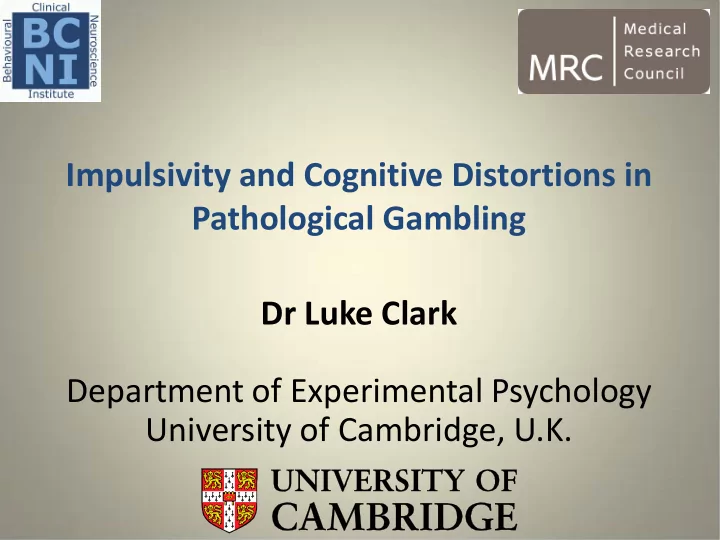

Impulsivity and Cognitive Distortions in Pathological Gambling Dr Luke Clark Department of Experimental Psychology University of Cambridge, U.K.
The Psychology of Gambling 1. How do we explain the prevalence of gambling if people understand that ‘the house always wins’? 2. How does gamble become dysfunctional (addictive?) in a minority? Brain mechanisms of decision-making and reward processing Emotional / Cognitive physiological distortions during responses in the gambling body
The Cognitive Approach to Gambling • Gamblers experience distorted processing of probability and randomness, such that they over- estimate their chances of winning • Distortions elevated in problem gamblers Gambling-Related Cognitions Scale 80 70 • Two basic types: 60 1) Sequential predictions based Total Score 50 40 on independence of turns 30 2) Mistaken appraisals of skill 20 10 due to perceived personal 0 Gamblers Controls control Clark (2010 Proc Roy Soc B), Michalczuk et al (2011)
The ‘Gambler’s Fallacy’ in Simulated Roulette Simple task: • Guess RED or BLACK • Then, rate your confidence Black, Black, Black, Black “RED!” (i.e. negative recency) Studer & Clark (in prep)
The ‘Gambler’s Fallacy’ in Simulated Roulette 50 % Choice of Previous 45 40 35 Choose red after Choose red after 30 50 % same as previous outcome 25 45 Short (1,2) Long (4,5) 40 Outcome Run Length 35 0.5 30 Z(Confidence Rating) 0.4 25 20 0.3 1 2 3 4 5 0.2 Consecutive Reds / Blacks 0.1 0 Confidence after Loss Loss -0.1 Confidence after Loss Loss Loss Loss Short (1,2) Long (4,5) Losing Streak
Near-Misses “A special kind of failure to reach a goal, one that comes close to being successful” (Reid 1986) 14 12 Trials in Extinction 10 8 6 4 2 0 15% 30% 45% Near-Miss Frequency Kassinove & Schare 2001
Near-Misses in a Simulated Slot Machine Selection - Anticipation - Outcome
Subjective Differences between Near- Misses and Full-Misses 0.1 0 Z score of rating -0.1 "Continue to -0.2 play?" -0.3 "Pleased with outcome?" -0.4 -0.5 -0.6 NearMiss FullMiss Clark et al (2009 Neuron)
Arousal Responses to Wins and Near-Misses Participant - NEAR Participant - WINS 0.012 0.035 All Non-Wins Participant - FULL SCR Change from Baseline (log + 1) SCR Change from Baseline (log + 1) 0.03 0.01 0.025 0.008 0.02 0.006 0.015 0.004 0.01 0.002 0.005 0 0 1 2 3 4 5 6 1 2 3 4 5 6 -0.002 -0.005 Time post-outcome (2s bins) Time post-outcome (2s bins) -0.004 Clark et al (2011 Journal of Gambling Studies)
fMRI Responses to Wins and Near-Misses A WINNING OUTCOMES minus ALL NON-WIN OUTCOMES P<.05 FWE Dopaminergic Anterior Ventral Striatum mPFC Midbrain Insula B NEAR-MISS OUTCOMES minus FULL-MISS OUTCOMES P<.001 uncorr Clark et al (2009 Neuron)
Gambling Severity predicts Near-Miss Activity in Midbrain 1.5 Percent Signal Change 1 0.5 0 0 5 10 15 20 -0.5 re-smoothed at 4mm -1 SOGS Chase & Clark (2010 J Neurosci)
‘Close only counts in horseshoes and hand grenades’ Horseshoes Fruit machine Game of skill Game of chance Near-misses provide indication of Near-misses provide no skill acquisition, and thus likelihood indication of future success of future success Should be ignored by brain Should be valued by brain reward system Griffiths (1993), Reid (1986)
Conclusions • Gambling distortions can be elicited in healthy individuals in a laboratory environment (Gambler’s Fallacy, effects of near- misses) • Near-miss outcomes are experienced as unpleasant but invigorate gambling behaviour • Wins and near-misses are associated with phasic changes in peripheral arousal • At a neural level, near-misses trigger anomalous activation in components of the brain reward system: VS, insula, vmPFC. • The size of these near-miss responses predicts susceptibility to gambling distortions in healthy volunteers (insula) and severity of gambling involvement in regular gamblers (midbrain) • No evidence for changes in (baseline) dopamine D2 receptors in PG, but correlations with impulsivity
Acknowledgements Imperial College, London University of Cambridge Henrietta Bowden-Jones Andrew Lawrence Paul Stokes Rosanna Michalczuk Anne Lingford-Hughes Henry Chase Kit Wu Mike Aitken Barbara Sahakian Robert Rogers (Oxford) Trevor Robbins Antonio Verdejo (U Granada) Barney Dunn (MRC CBU) Funding support: Medical Research Council MRC – Wellcome Trust Behavioural and Clinical Neuroscience Institute Economic and Social Research Council Responsibility in Gambling Trust (now RGF)
Recommend
More recommend